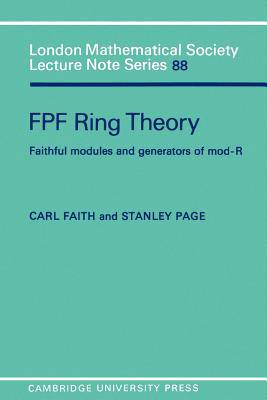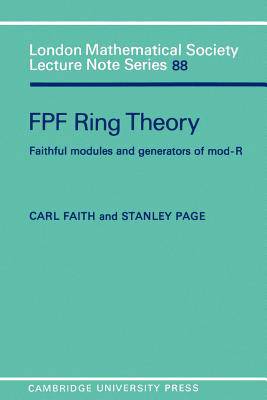
Bedankt voor het vertrouwen het afgelopen jaar! Om jou te bedanken bieden we GRATIS verzending (in België) aan op alles gedurende de hele maand januari.
- Afhalen na 1 uur in een winkel met voorraad
- In januari gratis thuislevering in België
- Ruim aanbod met 7 miljoen producten
Bedankt voor het vertrouwen het afgelopen jaar! Om jou te bedanken bieden we GRATIS verzending (in België) aan op alles gedurende de hele maand januari.
- Afhalen na 1 uur in een winkel met voorraad
- In januari gratis thuislevering in België
- Ruim aanbod met 7 miljoen producten
Zoeken
€ 72,45
+ 144 punten
Omschrijving
This is the first book on the subject of FPF rings and the systematic use of the notion of the generator of the category mod-R of all right R-modules and its relationship to faithful modules. This carries out the program, explicit of inherent, in the work of G Azumaya, H. Bass, R. Dedekind, S. Endo, I. Kaplansky, K. Morita, T. Nakayama, R. Thrall, and more recently, W. Brandal, R. Pierce, T. Shores, R. and S. Wiegand and P. Vamos, among others. FPF rings include quasi-Frobenius rings (and thus finite rings over fields), pseudo-Frobenius (PF) rings (and thus injective cogenerator rings), bounded Dedekind prime rings and the following commutative rings; self-injective rings, Prufer rings, all rings over which every finitely generated module decomposes into a direct sum of cyclic modules (=FGC rings), and hence almost maximal valuation rings. Any product (finite or infinite) of commutative or self-basic PFP rings is FPF. A number of important classes of FPF rings are completely characterised including semiprime Neotherian, semiperfect Neotherian, perfect nonsingular prime, regular and self-injective rings. Finite group rings over PF or commutative injective rings are FPF. This work is the culmination of a decade of research and writing by the authors and includes all known theorems on the subject of noncommutative FPF rings. This book will be of interest to professional mathematicians, especially those with an interest in noncommutative ring theory and module theory.
Specificaties
Betrokkenen
- Auteur(s):
- Uitgeverij:
Inhoud
- Aantal bladzijden:
- 176
- Taal:
- Engels
- Reeks:
- Reeksnummer:
- nr. 88
Eigenschappen
- Productcode (EAN):
- 9780521277389
- Verschijningsdatum:
- 26/04/1984
- Uitvoering:
- Paperback
- Formaat:
- Trade paperback (VS)
- Afmetingen:
- 154 mm x 226 mm
- Gewicht:
- 267 g

Alleen bij Standaard Boekhandel
+ 144 punten op je klantenkaart van Standaard Boekhandel
Beoordelingen
We publiceren alleen reviews die voldoen aan de voorwaarden voor reviews. Bekijk onze voorwaarden voor reviews.









